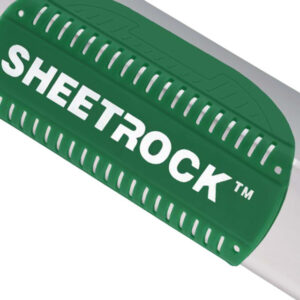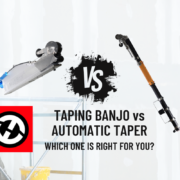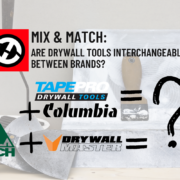
If you’re working on a drywall project or new to the wall-finishing industry, you’ve probably heard the terms drywall and Sheetrock® used on the job site. But are they really the same thing? And does it matter which one you choose for your project? We will let you know what the difference is, and when you should use each one.
What Is Drywall?
Drywall is found in almost every building, but most people never give a thought to it. Unless you to work in the construction field, you might not even know what it is. Drywall has become one of the most essential construction materials used today, but most people don’t really know what it is, what it is made of, and why it is important.
Drywall is a panel made of gypsum plaster sandwiched between two thick sheets of paper. It’s used to create walls and ceilings in homes and commercial buildings because it’s lightweight, fire-resistant, and easy to install. Drywall comes in different thicknesses (typically ½-inch or ⅝-inch) and there are specialized types, such as moisture-resistant or soundproof drywall.
What Is Sheetrock®?

Sheetrock is simply a brand name for drywall—much like Kleenex® is to tissues or Band-Aid® is to adhesive bandages. The U.S. Gypsum Company (USG) has been making gypsum products for over a century, and their reputation for producing the best is unrivaled. USG trademarked the name “Sheetrock” in the early 20th century, and because of its popularity, many people now use the term to describe all drywall products. USG is well-known in construction circles for creating a wide variety of drywall-related products and installation and finishing tools, as well.
Key Differences Between Drywall and Sheetrock
Technically, there’s no major difference in composition—Sheetrock® is just one brand name of drywall. However, USG offers various Sheetrock® products with unique features, such as:
- Sheetrock® UltraLight – Lighter than standard drywall, reducing strain during installation.
- Sheetrock® Mold Tough – Moisture-resistant for bathrooms and basements.
- Sheetrock® FireCode® – Enhanced fire resistance for safety-rated walls.
Other drywall manufacturers (like CertainTeed, National Gypsum, and Georgia-Pacific) produce similar products under different brand names.
Does It Matter Which One You Use?
For most projects, no—standard drywall and Sheetrock® perform the same function. However, if you need specific features (like mold resistance or lightweight panels), you might choose a branded Sheetrock product or an equivalent from another manufacturer.
While Sheetrock® is a brand of drywall, the name is often associated with higher-quality or specialized drywall tools and productss. When you are selecting materials for your project, be sure to focus on the type of product (moisture-resistant, fire-rated, etc.) you need. Whether you call it drywall or Sheetrock®, the right finishing tools and techniques will ensure a smooth, professional result.
Have questions about choosing the best drywall tools for your project? Drop us a DM, give us a call, or send us an email!

USG and Sheetrock are registered trademarks of U.S. Gypsum Company. See more at https://www.usg.com/content/usgcom/en/about-usg.html.


